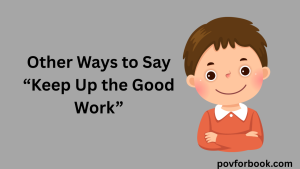Picture this: You’re a manager, teacher, coach, or even just a supportive friend. Someone does something exceptional — maybe they meet a tough deadline, improve their performance, or simply stay consistent over time. You want to encourage them, and you say: “Keep up the good work.”
It’s a solid phrase. Motivational. Polite. Friendly. But also… a little overused.
When you keep saying the same thing, your words lose their power. They start to feel automatic, generic, or even insincere. And the last thing you want is for your praise to go unnoticed or undervalued, especially when someone truly deserves recognition.
That’s where this article comes in.
In the next few minutes, you’ll discover 12 powerful alternatives to “keep up the good work” — each with specific use cases, examples, and tips. Whether you’re writing emails, giving performance reviews, coaching a team, or just offering encouragement to a friend, these phrases will help you sound more genuine, thoughtful, and impactful.
Let’s go beyond basic praise — and start acknowledging effort in a way that actually sticks.
Why Replace “Keep Up the Good Work”?
Before we dive into the alternatives, let’s understand why someone might want to move beyond this common phrase.
1. It Can Feel Generic
“Keep up the good work” is often used as a default response. While it’s not wrong, it doesn’t highlight what exactly was good about the work.
2. It Lacks Specificity
People appreciate feedback that shows attention. A vague phrase doesn’t convey that you noticed the how or why behind their success.
3. It Doesn’t Always Fit the Context
Sometimes, you need a phrase that’s more casual, more formal, more enthusiastic, or more professional depending on your audience.
4. Words Matter
Language has power. The right words can uplift someone’s entire week — especially when they feel noticed and appreciated.
What Makes a Great Alternative?

When choosing a replacement, look for phrases that:
- Are contextually appropriate (formal, informal, emotional, direct)
- Match the tone and purpose of your message
- Highlight the specific strength or achievement
- Feel authentic and natural in your voice
Now let’s explore twelve great alternatives — with real examples, variations, and tips.
1. “You’re Doing an Excellent Job”
Why it works:
This is slightly more formal than “keep up the good work,” making it perfect for professional settings. It shows you’ve evaluated the performance and genuinely believe in its quality.
When to use:
- In a performance review
- When providing written feedback
- During formal recognition or appraisals
Example:
“Your attention to detail on this report is outstanding. You’re doing an excellent job.”
2. “I Really Appreciate Your Efforts”
Why it works:
Acknowledges not just the outcome, but the effort behind it — perfect for morale boosting.
When to use:
- When someone is trying hard but hasn’t yet succeeded
- During difficult or high-pressure tasks
- In personal and professional situations
Example:
“I know the last few weeks have been challenging. I really appreciate your efforts — they’re not going unnoticed.”
3. “Keep Crushing It”
Why it works:
Energetic, casual, and motivating — this is great for high-performing individuals in creative or tech environments.
When to use:
- Informal messages, especially with peers or younger audiences
- Texts, chats, or casual workplace banter
Example:
“That client presentation was next-level. Keep crushing it!”
4. “Your Progress is Impressive”
Why it works:
It emphasizes growth rather than just performance. Great for people who are learning or improving steadily.
When to use:
- With students, interns, or trainees
- Coaching or mentoring contexts
Example:
“You’ve made significant strides in just two weeks. Your progress is impressive!”
5. “You’re on the Right Track”
Why it works:
A gentle and encouraging phrase that helps someone stay motivated, even if they’re not fully there yet.
When to use:
- Early stages of a project
- When someone is showing promise
- To boost confidence in self-starters
Example:
“Don’t worry if you’re not seeing big results yet. You’re on the right track — keep going.”
6. “Outstanding Work!”
Why it works:
Short, powerful, and high-impact. It sounds sincere and enthusiastic.
When to use:
- After a major success
- For performance highlights or achievements
- To make someone feel proud instantly
Example:
“That campaign you launched? Outstanding work!”
7. “I Can See How Much Effort You Put Into This”
Why it works:
People like to feel seen. This phrase highlights the behind-the-scenes work, not just the final result.
When to use:
- With team members who go the extra mile
- In emotional or thoughtful recognition
- When effort matters more than outcome
Example:
“Even though the pitch didn’t land, I can see how much effort you put into this. That dedication will take you far.”
8. “You’re Really Stepping Up”
Why it works:
Great for acknowledging leadership, initiative, or personal growth.
When to use:
- When someone takes on new responsibilities
- In transition phases or during crisis management
Example:
“With everything going on, you’re really stepping up. It’s great to see you take the lead.”
9. “You’ve Come a Long Way”
Why it works:
It reflects on the journey, which is ideal for people who’ve shown perseverance or overcome obstacles.
When to use:
- Long-term improvement
- In mentoring, teaching, or guiding roles
Example:
“From where you started to now — you’ve come a long way. Be proud of yourself.”
10. “You Set the Bar High”
Why it works:
Tells someone they’re not just performing well — they’re raising the standard for others.
When to use:
- With high-performers
- In team environments
- When you want to motivate the group through praise
Example:
“This month’s metrics are excellent. You set the bar high for the rest of us.”
11. “Keep That Momentum Going”
Why it works:
Acknowledges consistency and encourages someone to maintain their pace.
When to use:
- During ongoing projects
- For maintaining productivity or motivation
- As a follow-up compliment
Example:
“Your last few blog posts have been fantastic. Keep that momentum going!”
12. “You’re Making a Real Difference”
Why it works:
Especially impactful when the person’s work contributes to a larger goal or cause. It feels meaningful and sincere.
When to use:
- Nonprofit, education, healthcare, or mission-driven work
- Recognizing emotional labor or long-term contributions
Example:
“Thanks for staying late to support the new hires. You’re making a real difference.”
Comparing These Alternatives: A Quick Chart
| Phrase | Tone | Best For |
|---|---|---|
| You’re Doing an Excellent Job | Formal | Reviews, reports, written feedback |
| I Appreciate Your Efforts | Warm | Difficult situations, encouragement |
| Keep Crushing It | Casual | Informal settings, younger audiences |
| Your Progress is Impressive | Supportive | Growth tracking, mentoring |
| You’re on the Right Track | Encouraging | Early phases of work, new learners |
| Outstanding Work | Celebratory | Major wins, high performance |
| I See Your Effort | Thoughtful | Behind-the-scenes recognition |
| You’re Stepping Up | Respectful | Leadership, transitions |
| You’ve Come a Long Way | Reflective | Long-term progress, transformation |
| You Set the Bar High | Motivating | High standards, team-wide encouragement |
| Keep That Momentum Going | Energizing | Ongoing work, consistency |
| You’re Making a Difference | Meaningful | Purpose-driven roles |
Common Mistakes to Avoid When Praising Someone
- Being Vague
Saying “good job” without explaining what was good is a missed opportunity. - Overusing the Same Phrase
Repetition reduces the emotional impact over time. - Forgetting Timing
Praise is most powerful when it’s timely. Don’t wait too long to say something meaningful. - Not Matching the Tone
Saying “keep crushing it” in a formal board meeting? Probably not ideal. - Praising Outcomes Only
Appreciate the process and effort, not just results.
Tips for Giving Better Encouragement
- Be specific: Instead of “great work,” say “great work handling that customer call under pressure.”
- Be sincere: If your praise feels forced or routine, it won’t land.
- Adjust to the person: Some people respond better to emotional validation; others prefer concise praise.
- Mix it up: Use different phrases depending on context, tone, and frequency.
FAQs: Encouragement & Alternatives to “Keep Up the Good Work”
Q: Is “keep up the good work” outdated?
A: Not necessarily, but it’s often overused and can sound robotic. Using more specific or meaningful alternatives can have a stronger emotional impact.
Q: What should I say to someone struggling but trying hard?
A: Try “I really appreciate your effort” or “You’re on the right track.” These show support without applying pressure.
Q: What’s a great phrase for students or kids?
A: “Your progress is impressive” or “You’ve come a long way” works well for encouraging learners at any level.
Q: How do I praise a team rather than an individual?
A: “You all set the bar high this quarter” or “Your collective effort is making a real impact” acknowledges group success.
Q: Can I use humor or casual phrases in professional settings?
A: It depends on the culture. In startups or creative environments, casual praise like “keep crushing it” can work well. In corporate settings, stick to more formal phrases like “outstanding work.”
Final Thoughts: Make Praise Count
“Keep up the good work” will always have its place. It’s simple, easy, and often appreciated.
But when you really want to connect with someone — to recognize their growth, validate their effort, or fuel their motivation — the right words matter. The 12 alternatives shared in this article give you a toolbox of thoughtful, versatile, and powerful ways to encourage others.
Next time you want to motivate, recognize, or support someone, choose your words with intention. You’ll not only make their day — you might inspire their next big success.
Your next step?
Pick two or three phrases from this article and try using them this week. You’ll be surprised how much impact a few thoughtful words can have.
Find more related articles:
- 30 Other Ways to Say ‘Thanks for Checking In’
- 22 Dynamic Phrases Similar to “Be There or Be Square”
- Blank Is to Blank as Blank Is to Blank? (Fully Explained)
- 11 Powerful Ways to Say Thank You for Your Input Professionally
Deven Kumar is the passionate writer and founder behind povforbook.com, a website dedicated to exploring unique perspectives in literature and storytelling. With a deep love for books, language and traveling, Deven aims to inspire readers by sharing insightful reviews, thought-provoking synopses, Guiding tourist by sharing personal experience and engaging content that highlights the power of narrative. When not writing, Deven enjoys connecting with fellow book lovers and traveling lovers and continuously discovering new voices in the literary world.
